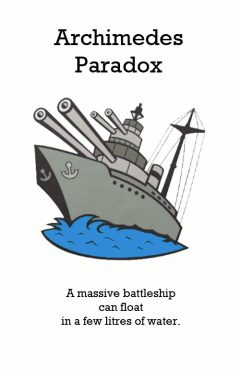Archimedes Paradox (aka the Hydrostatic Paradox)

Release Date: //
Country of Release:
Length:
MPAA:
Medium: Paradox
Genre:
Release Message: A massive battleship can float in a few litres of water. Authored by Archimedes.
Description: The Archimedes paradox, named after Archimedes of Syracuse, or the hydrostatic paradox, states that an object can float in a quantity of water that has less volume than the object itself, if its average density is less than that of water. A more general formulation of the paradox is that "that any quantity of water, or other fluid, how small whatsoever, may be made to balance and support any quantity, or any weight, how great whatsoever". The implication of this is that a large, massive object can float in a relatively small volume of liquid, provided that it is surrounded by it. One extreme application of the paradox is that a battleship can float in a few buckets of water, provided that the water surrounds the hull completely and that the ship would have floated had it been in open water.